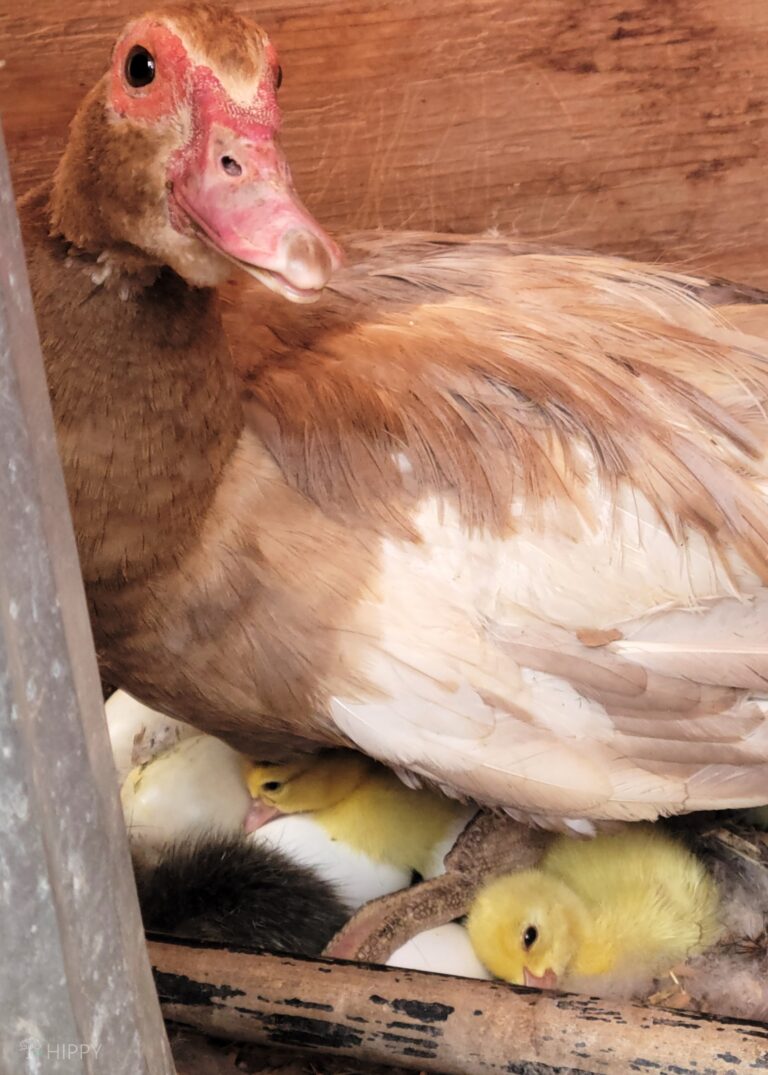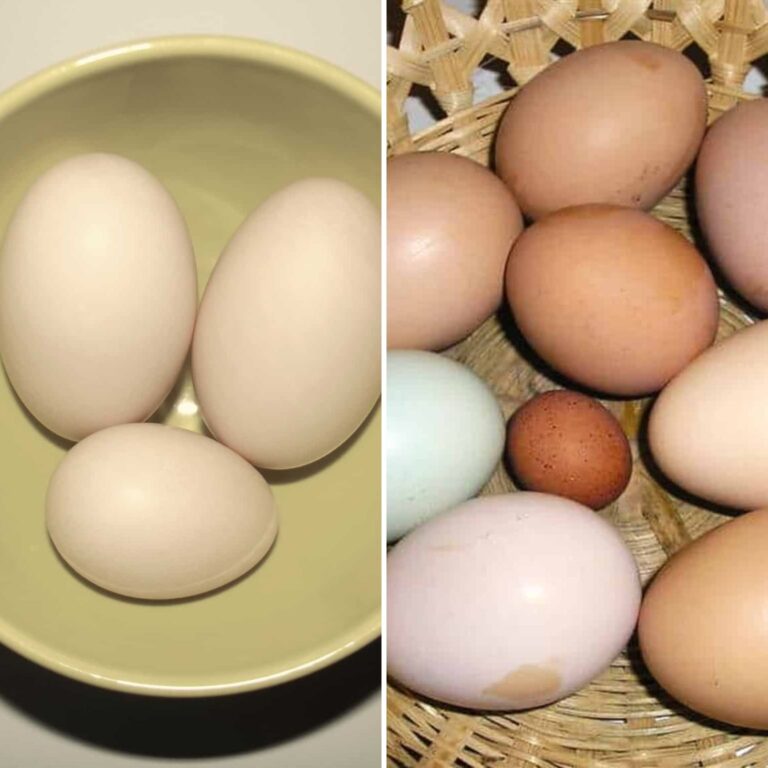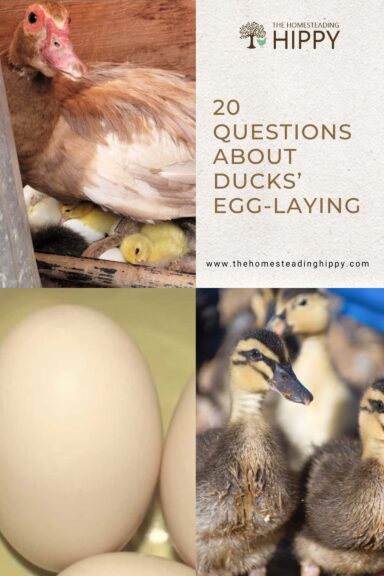If I were to say to you the word “egg,” the very next thing you think of would probably be “chicken.” And that’s for good reason! Chickens are indeed the main suppliers of eggs around the world.

But what you might not know is that ducks can also be excellent producers of eggs, and they even have some qualities that make them superior layers compared to chickens!
And truth be told, there are many similarities between these poultry species, but there are many differences, too, that are unique to ducks…
If you’ve ever had questions about ducks and the eggs that they lay, you’ve come to the right place. Keep reading and I’ll answer all of those questions!
Where Do Ducks Like to Lay Eggs?
Ducks generally prefer to lay eggs near the water when in the wild, preferably in a concealed, out-of-the-way location that’s usually protected by grass, reeds, or other obstacles. This helps keep both the female, or hen, and her eggs safe and secure.
But in captivity, they tend to use nesting boxes just like chickens once they’re familiarized with them, and if they find them to be adequate for their needs.
However, ducks that are allowed to free range will sometimes lay eggs in hidden locations that more closely replicate natural conditions!
Can Male Ducks Lay Eggs?
No, of course not! Male ducks, called drakes, are completely incapable of laying eggs. But, some folks might get confused because males and females of some species look nearly identical!
Will Drakes Sit on Eggs?
As a rule, no. Contrary to what is often reported, drakes do not sit on the eggs in order to help out the hen or to take over if something happens to her.
Once again, this might be a case of mistaken identity among males and females of a species that look nearly identical.
However, in flocks of domestic ducks and in some highly gregarious wild species, males may mimic the behavior of females when it comes to sitting on eggs, a phenomenon known as parroting.
Even in species where it does occur, it is extremely rare, and drakes cannot do a good job of incubating eggs like females do. It’s merely a matter of them behaviorally imitating other ducks that they see!
Do Female Ducks Need Drakes to Lay Eggs?
No. Once a female duck is fully developed and sexually mature, she will begin to lay eggs. She does not need to have intercourse with a male duck and does not need to be successfully fertilized for this to occur.
Said another way, any female duck that is healthy will eventually lay eggs whether or not there are any males around!
Do Ducks Always Lay Fertilized Eggs After Mating?
Yes and no. Assuming that both ducks are healthy and copulation was successful, the eggs that a female duck lays after mating will be fertilized by the sperm of the male.
Typically, a female duck can store and maintain a male’s sperm for about 2 to 3 weeks after successful mating and then lay fertilized eggs the entire time.
On the other hand, if the male or the female duck has some kind of defect or poor health, or if mating was interrupted or botched, she might continue to lay eggs normally but they won’t be fertilized.
Do Ducks Lay an Egg Every Day?
Much of the time, but not all the time. This is dependent on the season, the species and the health of the duck.
A highly prolific layer like a Khaki Campbell is entirely capable of laying an egg each and every day, at least during times of peak output.
On the other hand, breeds which are slower or highly variable layers, like Pekins, might lay an egg every 3 to 4 days.
How Many Eggs Can a Duck Lay Per Day?
Generally, at most, a duck is only capable of laying one egg per day, regardless of species.
How Old Are Ducks When They Start Laying?
It depends on the breed. Typically, smaller breeds will start laying earlier whereas larger and heavier breeds will start laying later on in life. This ranges between 4 and 7 months of age.
Some ducks are highly attuned to seasonal changes for their reproductive habits, and regardless of age, might only lay in the spring or summer so long as they are already sexually mature.
Muscovies
Large breeds like Muscovies might not start laying until they are 7 or even 8 months old.
Indian Runners
Small breeds like Indian Runners might lay as early as 4 months old.
Khaki Campbells
Famously good and quick layers, Khaki Campbell ducks will usually start laying between 5 and 6 months of age.
Pekins
Although they are larger ducks and highly variable, Pekins usually start laying a little early, around 5 to 6 months of age.
Do Male Ducks Bring Food to Females When Nesting?
Typically not. A male duck that is bonded to his female partner will stick around to help protect her, the eggs and the nesting site but he typically is only on guard duty while the eggs are incubating.
He’s not bringing breakfast, lunch or dinner to his lady! The male will, though, depart to get his own food from time to time.
The female, amazingly, will rarely if ever get up off of her eggs for any reason unless she has no other choice. Not even to go get food and water! Occasionally, though, a hen will make a mad dash to get a drink or a little nibble of food before coming right back.
How Long Do Ducks Sit on Their Eggs?
Typically, ducks will sit on their eggs the entire time until they hatch, a process that takes around 4 weeks plus or minus a couple of days. That’s a long time to wait for a diligent mother duck!
Note that although there might be very slight average variations in the gestation time of ducks, this timetable is remarkably consistent across different breeds and species.
Do Ducks Always Try to Hatch Their Eggs?
No, not in the case of domesticated ducks. Different breeds have different reputations for broodiness, a term that describes the likelihood that a mother duck will attempt to sit on, incubate, and successfully hatch her babies.
However, all ducks are individuals to a degree and certain hens might prove to be incredibly determined and diligent mothers, while others could not care less.
But, learning which breeds have a reputation for broodiness is important if you want to get along fabulously with your flock. Muscovies are famous, or rather infamous, for being militantly broody and highly protective mothers.
Cayugas fall somewhere in the middle, with these ducks sometimes being broody and sometimes not. Indian Runners are known for rarely being broody and are rarely insistent when they do go broody.
How Long Does It Take for a Duck Egg to Hatch?
A duck egg takes around 4 weeks to hatch from being laid to pipping, which is when the duckling inside starts to break out.
As a dependable guideline, hatching should be no quicker or slower than a couple of days at most either way. Significant variations usually indicate major problems.
How Often Do Ducks Lay Eggs?
A duck will, on average, lay anywhere from 2 to 5 eggs per week depending on breed, overall health, weather, nutrition, and other factors.
Seasonal layers may go for many months without laying a single egg and then lay an egg daily for a couple of months. Some will lay an egg like clockwork every few days, year in and year out. It just depends!

How Many Eggs Will a Duck Lay Per Year?
A duck may lay anywhere from 125 to 340 eggs per year. That’s quite a range, and as you might imagine it largely depends on the breed.
Most duck breeds are surprisingly prolific layers, but some are truly egg factories. The Khaki Campbell is one of the most respected high-output layers, cranking out anywhere from 250 to 340 eggs each and every year while they are capable of laying.
Pekins are highly variable layers but tend to be on the lower side, laying as few as 125 eggs per year and maxing out around 300 for exceptional birds.
Somewhere in the middle, you have the Magpie (duck, not the corvid) which lays anywhere from 220 to 290 eggs each and every year.
Why Do Ducks Stop Laying Eggs?
Ducks can cease to lay eggs for a whole host of reasons, including inadequate nutrition, illness, stress, weather, seasonal instinct, age, etc.
Part of maximizing egg production is keeping your ducks as healthy and happy as possible, but you obviously can’t do anything about factors like age, weather, or instinct.
If your birds have stopped laying and you know they’re a species that isn’t seasonal, it’s time to start assessing to find out what the problem is. Your duck might well need your help to get better!
Do Ducks Hide Their Eggs?
Yes, they can and they will! Ducks, like most birds and egg-laying animals for that matter, have an instinct to keep their eggs safe and as part of that instinct, they seek out safe, hidden places to lay.
You can expect to find your duck eggs under the coop, behind bushes, and patches of grass, beside fence posts, and of course, near bodies of water…
But ducks will also be more than happy to lay in a nesting box if they’ve gotten used to it, and if they decide that it meets their needs.
You can encourage them to lay in a nesting box by increasing the privacy that they have and making sure there’s enough room between them and other ducks.
Will Ducks Lay Eggs in Winter?
Yes, they will! Or at least most will. Ducks are famous both for being highly prolific and for being year-round layers, though they tend to slow down in the wintertime, and some will stop entirely if they are seasonal layers.
Generally, once the temperature is dipped down to around 20°F (-7°C) or below and the days start to get much shorter ducks will tend to slow down during the winter, but this can be offset with excellent nutrition, a warm coop, and additional lights.
Will Ducks Eat Their Own Eggs?
Yes, they can and they will. But they are only likely to do this if they are suffering from significant calorie or nutrient deficiencies, particularly calcium, or if an egg gets cracked, in which case the hen or drake might try to “recycle” some of the nutrients from the egg.
This could be highly problematic because it is possible for ducks to develop a taste for duck eggs!
That’s reason enough why you should never feed them eggs unless they are completely scrambled and cooked to mask the texture and aroma, and if you have a cannibalistic duck on your hands you might need to resort to using a decoy egg or golf ball to discourage eating.
How Many Eggs Will a Duck Lay in its Lifetime?
Anywhere from a few hundred to around 2,000 or even a little more. Ducks will usually lay eggs steadily for anywhere from 3 to 5 years, after which they will slow down significantly and some stop totally.
Some highly prolific species and particularly healthy ducks could keep on laying for 7, 8, or even 9 years, though they will certainly be putting out far fewer eggs by this time.
That means if you have a highly prolific species or individual duck you might have nearly 2,000 eggs from just that one bird in 5 years’ time!

Tom has built and remodeled homes, generated his own electricity, grown his own food and more, all in quest of remaining as independent of society as possible. Now he shares his experiences and hard-earned lessons with readers around the country.
Find out more about the team here.
